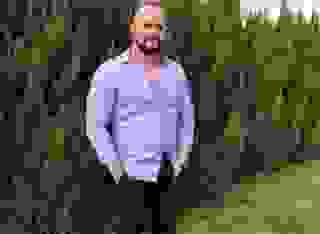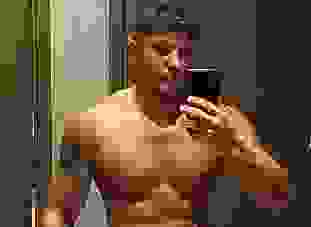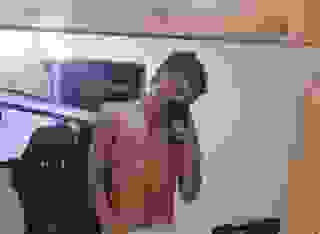- Gay Male
- The Forever Man
- Page 2
Note: You can change font size, font face, and turn on dark mode by clicking the "A" icon tab in the Story Info Box.
You can temporarily switch back to a Classic Literotica® experience during our ongoing public Beta testing. Please consider leaving feedback on issues you experience or suggest improvements.
Click hereOut on the street in front of the Morning Herald building, Allen wasn't sure what had happened between the time he'd seen that photograph and when he had been escorted out of the building. There were two young men with him—copyboys, Sandra had said. One was holding onto his arm like Allen could collapse at any moment. And, indeed, Allen felt like that might happen. The other one was flagging down a taxi.
His eyes downcast trying to focus on his shoes, Allen saw it and briefly thought that he must already be in front of his hotel. But the color of the chalk was a different color, and although the script was the same, it was written in larger letters. One word. "Forever."
Allen suddenly felt that the last thing Daren had said to him before he'd gotten on the plane in New York three months earlier was, indeed, prophetic. "Forever is a really long time."
Chapter Three: Pursuing Forever
Allen had said he wasn't going to the office party, but then he thought, "Why the hell not?" If he saw Daren there, accompanied by his wife, Sandra, why would that be Allen's problem? He wasn't the one who had cheated on anybody. He wouldn't purposely do anything to embarrass Sandra. He liked Sandra, and none of this was any of her fault either.
And when Allen arrived at the restaurant, there, sure enough, was Daren, standing beside his wife at the other end of the bar where everyone was congregating before the group formed and could be seated in the banquet room. Daren was talking animatedly to other journalists, several of them Allen's new colleagues at the Morning Herald. And then Daren turned and saw Allen, standing at the doorway into the bar area and backlit by the lights in the restaurant entrance. Daren blanched, leaned over and said something to his wife, and moved toward the back of the restaurant.
Allen followed him. He didn't mean to make a scene, but he was hurt, deeply hurt, and he wanted some sort of closure, some word from Daren—perhaps some sort of fairytale explanation that would make it all fine and good. No, Allen wasn't that stupid; he knew there would be no happy ending. But he wanted some sign that what had happened between Daren and him had some reality, some validity.
Daren was standing at a sink in the men's room when Allen entered, bathing his face in cold water.
"Daren."
"Why? Why did you come?" Daren asked in a voice touching on belligerence. "Why can't you—?"
"These are people I work with, Daren. This is my office party. If this makes you uncomfortable, you should be the one to—"
"No, I mean why did you come to Australia at all? Couldn't you see that it was over?"
"No, I couldn't see that, Daren. How was I supposed to see that? What clue did you give me? I don't remember you telling me there was a Sandra and two young boys in the picture. I saw that picture, you know. On Sandra's desk. She seems to be quite happy with her family. You've seemed happy to be with me."
"I don't think you understood—you certainly didn't listen. You were always talking 'forever' this and 'forever' that. Did you ever stop and look at me . . . listen to me? Did I ever talk in terms of permanence? Didn't I always say I would be going home?"
"I don't know?" Allen said. And at that moment he didn't know. Maybe this had been as much his fault as Daren's. Maybe it was true that he had played make believe, had made assumptions based on what he wanted it to be rather than what it was. One thing was perfectly clear, though. "You took what you wanted despite what I was saying, what I clearly wanted, didn't you? Not listening cuts both ways, Daren. But your problem wasn't that you didn't listen, was it? Your problem was that you saw what you wanted and you took it no matter who it might hurt—just living in the moment, with no consideration of the long term. And this was hurtful to more than me."
"What are you going to tell Sandra?" Daren asked. He was moving in closely, running his hand along the edge of Allen's shirt—suggestively. He'd always known how to end arguments with Allen. Even as Allen felt the old urges rising in him at Daren's touch, he realized he was being manipulated. That this was the way Daren had always wiggled out of arguments. And that it had always worked with Allen before.
At that moment Allen fully realized that he didn't want Daren. Daren was still only thinking about Daren—and how he could continue getting what Daren wanted.
"I'll tell Sandra nothing unless she asks . . . or if I think you are doing this here, with someone else. You told me I was the only one. Was that a lie too?"
"No," Daren said. But he couldn't look at Allen when he said it. And Allen didn't believe him. Allen was cured of Daren now. He wondered why he hadn't been able to see the real man behind that handsome, outgoing façade to begin with.
Neither man said anything for a moment. It was obvious that Daren wanted to leave, wanted to be gone. But Allen stood between him and the door, and Daren shrank from Allen, didn't want to brush against him in the close quarters of the men's room to get to the door.
At last, to break the silence if nothing else, Daren said in a low voice, "Please go home, Allen—back to the States. There is nothing here for you."
And Allen, in a final act of defiance, answered, "I don't think so, Daren. I like it here, and I'm enjoying working with Sandra and the others at the Morning Herald. I know you want me out of your life, no longer a threat in any way to you, forever. But I rather think I will stay on here in Sydney for a while."
Having said that, he turned and walked out of the men's room and just kept on walking. One of his colleagues clutched at his sleeve as he marched through the bar, asking if he wasn't going to stay for the food, but he just smiled a vacant smile to her and said something about something having come up and proceeded out of the restaurant and onto the street.
And then he walked, blindly. His steps took him to Taylor Square and Oxford Street. He looked up and saw that he was standing in front of the Oxford Hotel and there was a sign for Gilligans. This rang a bell and he entered the hotel, descended to the basement club, sat at the bar, and ordered a beer. His head was still spinning from his encounter with Daren, and he wanted to do something to release the pent-up fury deep inside him—something daring, something he normally wouldn't do.
"Hi, there, so you remembered and came," a voice said at his elbow.
Allen turned. The man from the plane. The one who had told him about Gilligans, although it only now registered with Allen where he'd heard about Gilligans—and what could be had there.
"Allen, isn't it? A writer for the Times?"
"Yes, and you are? I mean, I know I met you on the plane. But you have me at a disadvantage. You know who I am, but I don't know your name."
There was a pause, and the men then smiled. "Ted. Call me Ted. Can I buy you a beer?"
He had hesitated a second too long in coming up with a name. Allen knew that wasn't his real name. But Allen was pissed at the world, and he wanted to do something, something reckless. He wanted to let loose. Daren had baited him about being too obsessed with permanence. While Allen had been walking the streets, he had been musing on Daren's accusation that Allen had never paid attention to reality in their brief affair, and, going over events, Allen had to admit that Daren had often gone silent and moody when Allen had mentioned permanence.
Allen thought he could do temporary, though. He thought Daren was just overblowing that. And there didn't seem to be anything more fleeting, more temporary now, than this guy he'd met on the airplane, the guy calling himself Ted.
"Sure I'd like a beer," Allen said, turning and giving "Ted" a saucy look. "You buying?"
"I can do that. I can take care of you. I can take good care of you." And then "Ted" smiled broadly, showing that he knew some invisible barrier had been crossed, when it was evident that Allen fully understand what he was proposing with that phrase—and didn't flinch from it. Allen knew that letting "Ted" buy him a beer was signaling that the man was buying him.
Allen said yes to a second beer. Allen didn't say no when "Ted" placed one hand on his thigh and the other on the small of his back. And Allen said nothing when "Ted" ran his hand down inside the waistband of Allen's trousers. And then Allen said yes when "Ted" suggested they go someplace more private. And he said yes again when "Ted" asked him if he had someplace they could go.
They were in back of the taxi on the way to the Four Seasons hotel and "Ted" had his hands roaming all over Allen's body and was whispering what he wanted to do to Allen, without Allen showing any hesitation or loss of interest, when Allen noticed, in the flashing of the changing light from the street they were moving down, the discoloration on "Ted's" hand. One of his fingers—his ring finger—wasn't as tanned at the ring line as the rest of the finger. And now that Allen had seen it, it became obvious. So much about "Ted" became obvious. And Allen couldn't look at "Ted" and not see Daren instead.
In the lobby of the hotel, Allen hesitated. He said he was having second thoughts. They sat in the lobby for several minutes while "Ted" cajoled him and tried to convince him to go upstairs. But in the end "Ted" gave up, muttering under his breath that Allen was just a tease and had ruined his evening. If it hadn't been for the missing wedding band, Allen would have felt some remorse. As it was, he thought it was a toss-up on who was leading who on.
Allen came out on the street at the hotel's entrance to see the man who wasn't Ted off in a taxi. Allen's question, after "Ted's" remonstrations were approaching belligerence, on whether the man had a wife and children at home in the States, had been enough, when Allen had pointed to the missing wedding ring, for the man to leave without further fuss.
As Allen watched the taxi pull away, he looked up toward the corner, where people were gathered around in a circle and looking down at the sidewalk. A man, a white-haired, hunched-over man in a threadbare suit, was kneeling down at the sidewalk. Allen's initial thought was that the man had collapsed, that he was in physical distress. And Allen wondered why people were just standing around him and looking down at him.
Wondering what was happening, Allen approached. As he drew closer, he saw that the man had colored chalk in his hand and he was writing on the sidewalk.
"How peculiar," Allen thought. He's defacing public property and people are just standing around him, watching. And not doing anything. There even was a policeman standing nearby. And he was just smiling and nodding his head.
Allen was close enough now to see what the man was drawing. It was script. He was writing the word "Forever" in a large, elegant script. He was finished with that in one color of chalk and was outlining the word with another color, making it stand out, looking almost three dimensional.
Allen thought back to having seen this before on the sidewalk—in the front of his hotel earlier and then at the Morning Herald building. It was fascinating. But at the same time, it brought up a deep anger from inside him. It was a mockery of his life—what he had striven to obtain and what had been taken away from him. So easily stripped from him by Daren. Allen wanted the people to leave. The artist to leave and the people standing around the artist to go away. To leave him alone with the word on the sidewalk.
And then he wanted to stomp the word, to rub the soles of his shoes across it. To obliterate the false hope that it proclaimed.
The word finished, the old man looked up and scanned the group of people around him. His eyes were glittering, wet with tears. And his gaze was met with friendly, knowing smiles and slight inclination of heads. There seemed to be something they all knew, something that Allen wasn't privy too. He felt so alone. A stranger in a strange city—and frozen out of some secret everyone here knew and appreciated—and he didn't.
A tall, thin, young man, workman rough in appearance, but himself handsome and dignified, stepped out of the circle of onlookers and helped the artist up from his crouching position, and the two of them, the old man limping and leaning heavily on the younger man, slowly walked down the street and out of view.
Allen wanted the others to disperse. He wanted to obliterate this lie, this joke of cruel humanity. And slowly, most taking a last lingering look, smiling a final small smile, the onlookers began moving away and at least for the moment Allen was alone with the word "Forever" written in chalk at the corner of two busy city streets.
He walked over and lifted his shoe, but then he brought it back down, inches away from the drawing. He couldn't do it. He didn't know why he couldn't do it, but somehow, deep inside him, he knew that he'd never be able to hope for or write of the dignity of man again if he wiped that away—if he lost the concept of "forever."
* * * *
"Shawn Martell?"
"No, doesn't ring a bell."
"Journey to the Outback or Forever Again. Both epic poems?"
"No, sorry. Never heard of them."
Sandra Martin sighed and sat back in her chair. "I guess we really are insular and forgotten down here," she said. "Shawn Martell was probably our greatest poet of the twentieth century. He was all the rage on the literary scene in the 60s. They've written on him before, of course, but his birthday is coming up tomorrow and I don't remember seeing anything written on the ritual in years. I don't know if it's still happening. I thought it would be a good piece for you to write—from a fresh perspective, and maybe something you could send back to the Times as well. It actually goes with a longer series we are running. A time capsule from the Second World War is being opened this year—a sixtieth anniversary celebration they determined when the capsule was sealed. We have a list of items in the capsule, which contains works by war veterans, including several famous Australian writers of the day. We're doing a 'what about them today' series. Shawn Martell was one of the poets whose work is inside the capsule."
"Birthday? Ritual?" Allen asked. "Does he swim nude in the ocean or something on his special day? Swim from Circular Quay to Botany Bay, does he?" Allen was trying to keep it light with Sandra. He always wanted to keep it light with her. He sensed that Daren had said something to her about him—something derogatory, probably, so that she'd keep him at arm's length. But Allen liked Sandra, and he didn't want to be on the outs with her. And he had to work with her. But maybe that was Daren's angle. Maybe he was trying to make life uncomfortable for Allen at the Morning Herald so he'd decamp and go back to New York. All the more reason for Allen to dig in his heels and stay longer, though. To Sandra's credit, she was being totally professional in their relationship. And Allen had to admit that at the moment she was trying to help give him topic ideas for feature stories.
He already knew what story he wanted to research and write, though. Since that night he'd seen the old graffiti artist drawing "Forever" on the sidewalk in front of the Four Seasons, it seemed like that word was popping out in chalk on sidewalks wherever Allen went in Sydney. It no longer made him feel like an outsider. Rather, it now seemed to be offering him encouragement everywhere he turned—validating his values.
But it was still a mystery to Allen why the old man did it—and why the people of Sydney seemed to embrace him doing it, almost like he was the city's good-luck charm.
"Oh, he's no longer with us. He celebrates his birthday in Rockwood Cemetery. And maybe that's a good place for you to start looking if you're interested in doing the story."
Sandra was still discussing the poet Shawn Martell.
"OK, tell me about it," Allen said. Sandra was giving him a lead. He'd give her the respect she deserved.
"Twice a year, on his birthday and on the anniversary of the day he died, a mysterious man appears at the cemetery and leaves a dozen red roses and a bottle of cognac—always Martell cognac, to match his name, I guess—at the grave site. He's been doing it for decades. For years no one knew who was doing it at all, and it wasn't known if it was one person or members of a Shawn Martell fan club. And even when the man has been seen, he hasn't responded to questions. As far as I know, no one has interviewed him and no one has written the story of why he does this and what his relationship was to Martell. If you could get that story, there might be great interest."
"For decades?" Allen asked. "It sounds like my sort of guy. OK, I'll see what I can find out."
Allen was only half interested in the story possibility, but it gave him an excuse to get back out on the street. He loved walking in Sydney and seeing life pulsating around him in this vibrant, friendly, beautiful city. And, for him, there seemed to be an uplifting message for him on nearly every street corner—the simple word "Forever," scrawled in elegant script in multicolored chalk. In other cities Allen liked to walk in the rain or after the rain, when the fragrance on the breeze was fresh. In Sydney, though, he wanted to wait for a while after it rained—he wanted to wait until the chalked words reappeared. He didn't like to see the "Forevers" washed away, and he was so happy that he hadn't rubbed the one out in front of the Four Seasons himself.
Allen got out on the street and walked downhill, toward Circular Quay. Sandra had told him how to get out to the Rockwood Cemetery in the eastern suburbs—to take the CityRail Bankstown line out to Lidcombe station and walk back the three blocks. She'd given him a map and pinpointed where the poet, Shawn Martell, was buried. She'd said the grave would be easy to find, as the monument stood higher than those around it and space had been left around the grave site. She'd told him again that Shawn Martell was famous in Australia, and this time Allen had marked that with proper reverence.
As Allen approached Circular Quay, though, he saw them. The old man, and the good-looking younger workman, across Alfred Street from the transport terminals at Circular Quay, where the rail lines and buses intersected and ferries departed for points all up and down the broad harbor, floating past the Sydney Opera House as they left the quay. The old man was putting the finishing touches on one of his "Forever" masterpieces. And once again, a crowd had gathered around him, everyone smiling and whispering to each other and showing the friendliness and good spirits that Allen had found to be the hallmarks of Australians.
Allen lost all interest in the assignment Sandra had given him. The background story he wanted, the feature he wanted to write about was the story of this old man—and of why the people of Sydney seemed to revere him and his message so much.
Allen's eyes went to the man who was with the old man as, finished now, the old man was being helped up off his knees again. The younger man was having a little difficulty lifting the older man, and a couple of the spectators leaned down and were helping them. Allen could see that the younger man was being encumbered because he held a package and a bouquet of flowers in his arms.
The two turned and crossed Alfred Street to the ferry terminal, and Allen picked up his own feet and hurried after them. He was intent on this story now. He wanted to know and he wanted to write about it. Nothing was more important to him now than what lay behind that word: Forever.
The two weren't taking one of the ferries, Allen could see. They were struggling up the steps to the rail platform and queuing up for the Bankstown line. Allen bought a MyTrain 5 pass at the automated machines, the one giving the greatest distance, sixty-five kilometers. He had no idea where he was going—other than wherever those two men were going.








